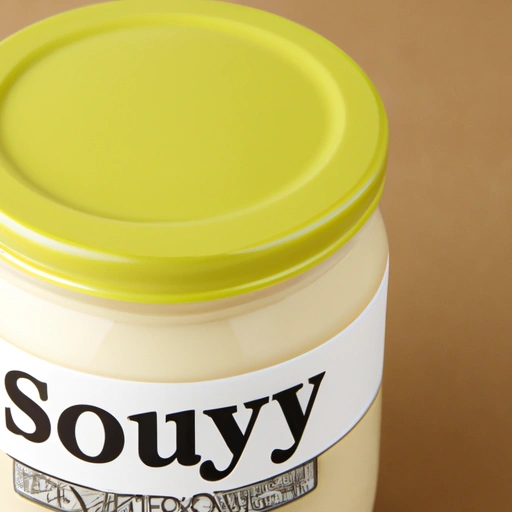Soy Mayonnaise
Description

Soy mayonnaise is a creamy, stable emulsion traditionally made from soybean oil, water, and a protein-rich component such as tofu or soy protein, often including vinegar or lemon juice, mustard, and seasonings to enhance its flavor. It is a vegan alternative to regular mayonnaise made from eggs, accommodating those with egg allergies or dietary restrictions. This condiment is known for its versatility, and despite its distinct origins, it maintains a taste and texture similar to its traditional counterpart.
Common uses
Soy mayonnaise is commonly used as a spread on sandwiches, in dressings for salads, as a base for creamy sauces, in dips, and to create a rich texture in various other recipes. Its use extends beyond that of a mere condiment, serving as a key ingredient in several dishes.
Nutritional value
Calories
Typically, soy mayonnaise contains about 50-100 calories per tablespoon (approx. 15 grams), varying based on the specific recipe and brand.
Protein
Each tablespoon of soy mayonnaise offers about 0.1-1 gram of protein, depending on the concentration of soy ingredients used.
Fat
The fat content in soy mayonnaise is approximately 5-10 grams per tablespoon, predominantly consisting of polyunsaturated and monounsaturated fats from the soy oil.
Carbohydrates
Carbohydrates are minimal in soy mayonnaise, usually less than 1 gram per tablespoon, making it a low-carb option for those monitoring their intake.
Vitamins
Soy mayonnaise can be a source of Vitamin K, Vitamin E, and sometimes fortified with additional nutrients like Vitamin B12.
Minerals
It may contain trace amounts of minerals such as potassium, sodium, and occasionally calcium and iron, particularly if fortified.
Health benefits
Soy mayonnaise can contribute to a heart-healthy diet due to its content of beneficial fats from soy oil. It also supports a plant-based diet, which has been associated with reduced risk of chronic diseases. The absence of eggs makes it a safe choice for those with egg allergies or intolerances.
Potential risks
Overconsumption can lead to excess calorie and fat intake. It may contain additives or preservatives, and those with soy allergies should avoid it. Always check labels for potential allergens and additives.
Common recipes
Soy mayonnaise is used in vegan versions of classic dishes such as potato salad, coleslaw, and deviled eggs (using alternatives to egg whites). It's also a base for creamy salad dressings and aioli.
Cooking methods
It is primarily used cold and not intended for high-heat cooking, which can separate the emulsion.
Pairing with other ingredients
This versatile condiment pairs well with a variety of foods including sandwiches, burgers (particularly veggie burgers), and as a dip for fries and vegetables.
Summary
Soy mayonnaise is a vegan-friendly, versatile condiment that has carved a niche for itself in the culinary world. It mirrors the creamy texture and flavor profile of traditional mayonnaise while being suitable for those with dietary restrictions. Its nutritional benefits and potential health advantages make it a popular choice among health-conscious consumers and vegans alike.